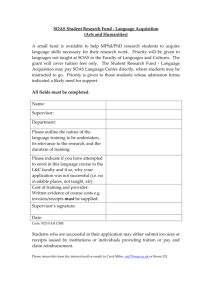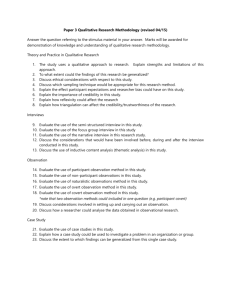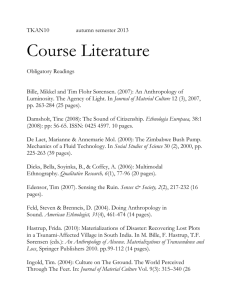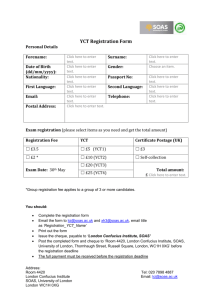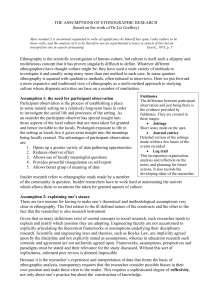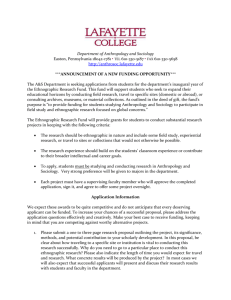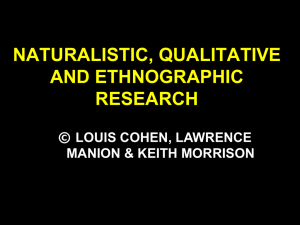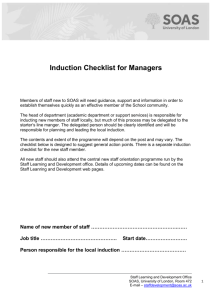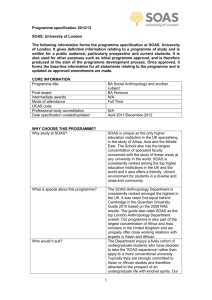Workshop Details - The British Sociological Association
advertisement
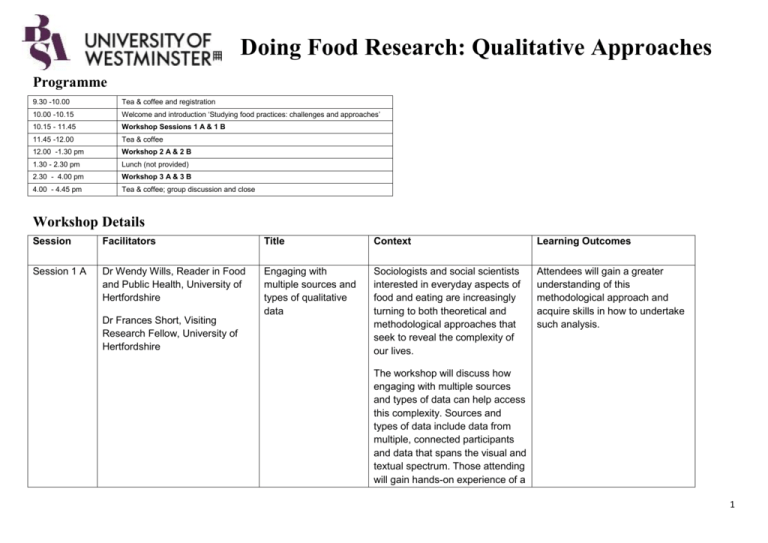
Doing Food Research: Qualitative Approaches Programme 9.30 -10.00 Tea & coffee and registration 10.00 -10.15 Welcome and introduction ‘Studying food practices: challenges and approaches’ 10.15 - 11.45 Workshop Sessions 1 A & 1 B 11.45 -12.00 Tea & coffee 12.00 -1.30 pm Workshop 2 A & 2 B 1.30 - 2.30 pm Lunch (not provided) 2.30 - 4.00 pm Workshop 3 A & 3 B 4.00 - 4.45 pm Tea & coffee; group discussion and close Workshop Details Session Facilitators Title Context Learning Outcomes Session 1 A Dr Wendy Wills, Reader in Food and Public Health, University of Hertfordshire Engaging with multiple sources and types of qualitative data Sociologists and social scientists interested in everyday aspects of food and eating are increasingly turning to both theoretical and methodological approaches that seek to reveal the complexity of our lives. Attendees will gain a greater understanding of this methodological approach and acquire skills in how to undertake such analysis. Dr Frances Short, Visiting Research Fellow, University of Hertfordshire The workshop will discuss how engaging with multiple sources and types of data can help access this complexity. Sources and types of data include data from multiple, connected participants and data that spans the visual and textual spectrum. Those attending will gain hands-on experience of a 1 Session Facilitators Title Context Learning Outcomes multi-method/multi-modal analytic strategy as well as a deeper understanding of the practical and ethical challenges that can arise from this approach. Session 1 B Prof. Harry West, Professor of Anthropology and Chair of SOAS Food Studies Centre, SOAS Dr Lizzie Hull, Lecturer in Anthropology, SOAS and LCIRAH Dr Deborah Johnston, Reader in Development Economics, SOAS Sara Stevano, PhD Candidate in Economics, SOAS and LCIRAH Using ethnographic methods in food research: anthropology and beyond In a context of heterogeneous food acquisition practices and food habits, documenting what people eat, why, and to what effects, is a complex exercise. Ethnography and participant observation can help shed light on these complexities, enabling access to social situations and practices as well as underpinning epistemologies that may lie beyond the remit of other methods. This workshop will discuss the use of participant observation in anthropological work and beyond. Researchers from different disciplinary backgrounds (anthropology and economics) will explain how they used participant observation in their own research, highlighting advantages and limitations encountered. Participants will be encouraged to reflect on the possible uses of participant observation on its own and in combination with other Workshop participants will • be able to describe the ethnographic method, including the key elements of participant observation and data collection; • understand the kinds of social phenomena that can be using ethnography; gain practical knowledge about how ethnography can be used as a component of a wider project, and know where to find further information about ethnographic methods. 2 Session Facilitators Title Context Learning Outcomes methods to conduct food research. Session 2 A Angela Meah Post-doc research fellow Visual and Mobile Methods Dept. of Geography, University of Sheffield Reflecting the increasing salience of both the visual dimensions of social life and that our relations with food are not spatially fixed, this workshop will provide an overview of a range of (participatory) methods, including: photography, video, photo voice, drawing, and mapping, along with potential uses. However, while visual methods offer potentially rich insights which cannot be fully captured by discursive accounts alone, they nonetheless come with particular challenges, both practical ethical, which researchers may feel prohibitive of their use. This workshop will address some of these concerns. 2B Dr Rebecca O’Connell and Heather Elliot, Researcher Officers, Thomas Coram Research Unit, Institute of Education, University of London Dr Andrea Tonner , Lecturer in Marketing, Strathclyde Business School, University of Strathclyde The possibilities and challenges of online data in food research Online fora such as blogs and chatrooms offer potentially rich sources of ‘data’ for studying food practices. This session provides an overview of the potential affordances of such approaches and outlines two studies, conducted by the convenors, By the end of the session, workshop participants will have gained a greater awareness of the ways in which a range of visual methods can be used in food research. Importantly, the workshop also addresses the some of the ethical constraints to be aware of in both the collection of visual data and dissemination of findings from such data. By the end of the session participants will be aware of: The potential affordances of online fora as ‘data’ in food research Considerations in ‘sampling’ from 3 Session 3A Facilitators Dr Abigail Knight, Research Officer, Thomas Coram Research Unit, Institute of Education, University of London Title Using archives and reusing qualitative data in food research Dr Polly Russell, Social Science Curator, The British Library, London 3B Dr Alizon Draper, Reader in Public Health Nutrition, Westminster University Doing food research for government Context Learning Outcomes which have sought to analyse blogs as data. Activities will allow participants to consider the practical, ethical and analytical challenges involved. the web Oral history and qualitative data archives contain a wealth of data which may be useful for social scientists studying food practices. This session provides a brief introduction to some recent studies which have used these data for studying food and eating and introduces participants in more detail to two sources of data - The Mass Observation archive at Sussex University and the Oral History collections at the British Library. Through engaging handson with some archival and oral history data extracts, participants will consider the conceptual and practical opportunities and challenges involved. A number of different UK government departments commission research across a range of food issues extending from climate change to food safety. Substantial opportunities thus exist to gain government Some approaches to analysis including visual and textual data Some of the other sorts of information that might be helpful in making sense of blogs as ‘data’ By the end of the session participants will: Have reflected on the significance for research projects considering re-use of the context in which an archive exists. Be familiar with some recent studies which have used oral history and archived qualitative data to study food practices Have considered some of the conceptual and practical advantages and disadvantages of using or reusing data not collected for these purposes Be aware of where and how such data might be accessed By the end of the session participants will: • Be aware of different sources of funding for food research within the UK 4 Session Facilitators Hannah Lambie-Mumford, PhD Researcher, Department of Geography, University of Sheffield Helen Atkinson, Social Science Research Unit, Food Standards Agency Title Context Learning Outcomes funding for food-related research, but the process of applying for funding and the factors involved in successful delivery are usually very specific and differ to those associated with other funders such as the Research Council. Who funds what, how to apply and deliver on government grants will be examined in this workshop. government • Understand the process of applying for such funding • Be aware of the administrative and legal requirements of working for government to enable you to deliver projects successfully 5
